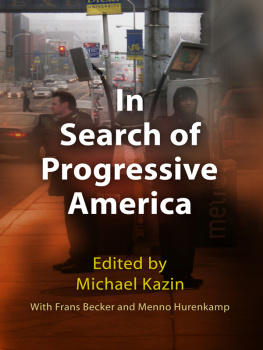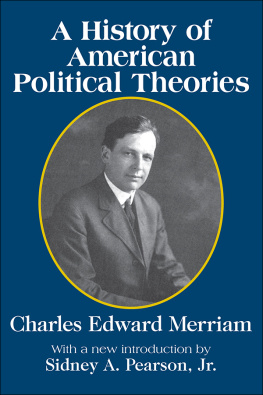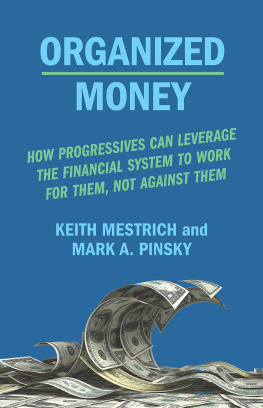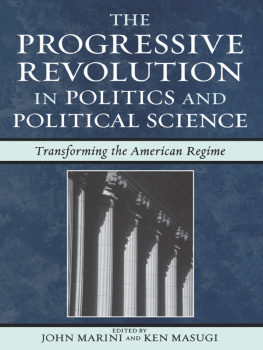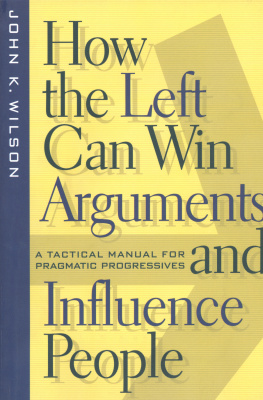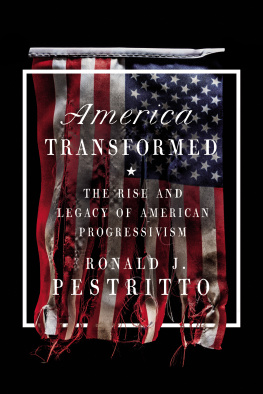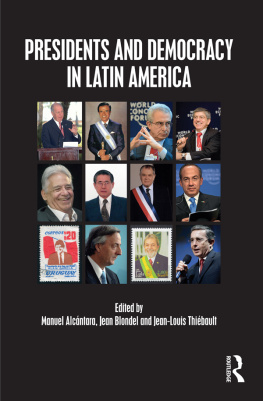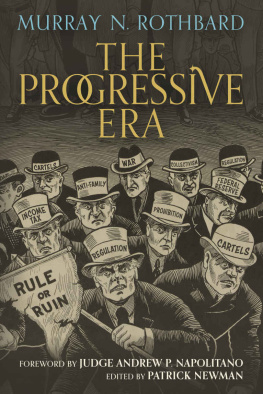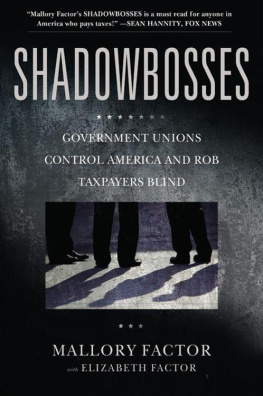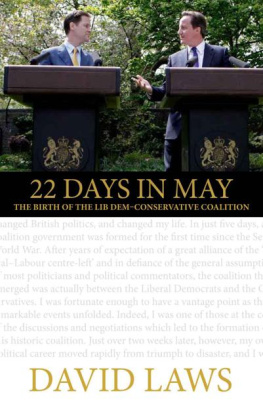Copyright 2008 University of Pennsylvania Press
All rights reserved. Except for brief quotations used for purposes of review or scholarly citation, none of this book may be reproduced in any form by any means without written permission from the publisher.
Published by
University of Pennsylvania Press
Philadelphia, Pennsylvania 19104-4112
Printed in the United States of America on acid-free paper
10 9 8 7 6 5 4 3 2 1
Library of Congress Cataloging-in-Publication Data
In search of progressive America / edited by Michael Kazin ; with Frans Becker and Menno Hurenkamp.
p. cm.
Includes bibliographical references.
ISBN 978-0-8122-2038-4 (alk. paper)
1. United StatesPolitics and government2001. 2. Progressivism (United States politics). I. Kazin, Michael, 1948. II. Becker, Frans. III. Hurenkamp, Menno, 1971.
JK275.I5 2008
320.5dc22
2008012680
Introduction
Toward a Second Coming?
Michael Kazin
During the final year of the reign of Bush and Cheney, the era of conservative dominance also appears to be stumbling toward an end. No administration has been so unpopular since the early days of disco. And the fall of Richard Nixon in 1974 was due primarily to the Watergate scandal, not to the accumulation of disastrous policies stretching from the levees of New Orleans to the streets of Baghdad. When his Texas protg campaigned for president in 2000, Karl Rove predicted the GOP would hold power for decades to come. Clever activists on the Right would weld a durable majority by keeping taxes down, turning Social Security into a private concern, welcoming immigrants who rejected unions, and returning abortionists to back alleys. But that brave new political world was strangled in its cradle in 2006 when the Democrats recaptured control of Congress.
Behind the Right's collapse lay a sea change in public opinion. Nearly every poll taken after the 2006 election found that most voters agreed with views liberals had long advocated. Solid majorities favored: a big hike in the minimum wage, government-mandated health insurance for every American, stronger gun control laws, sex education programs that talk about condoms as well as abstinence, laws that would make it easier for unions to organize, and using diplomacy instead of war to combat terrorism. Writing for the Nation, Rick Perlstein composed a little ditty about the polls: You suspected it all along, Now it just might be true: Most Americans think like you.
But it was far from clear that progressives, the mildly inclusive term now favored on the broad Left, were ready to take charge. The New Deal erathose golden years of reform from the early 1930s into the mid-1960sbegan with a similar collapse by a similarly dominant Right. President Herbert Hoover and the Republican majority in Congress did not foresee the Great Depression and failed to mitigate the suffering it caused. But Franklin D. Roosevelt and the crusading liberals who followed him to Washington did not change the nation simply by reminding Americans that their opponents were clumsy and callous. A few years after defeating the GOP, liberals accomplished two goals essential to birthing a new governing order in a democratic state: a compelling, easily understood program and a broad, dependable coalition.
Neither Democratic politicians nor the activists who pressure them from the Left has demonstrated that they know how to repeat that performance. Until they do, there will be no second coming for progressive America. The pols need to turn the change in public opinion, which is hopeful but dormant, into a dynamic vision of how the government can help ordinary Americans lead more secure and more prosperous lives. The activists are long on righteous anger but short on the hard work of reaching people who neither attend protest marches nor routinely click around the blogosphere. Neither group has figured out how to tether optimistic talk about an emerging Democratic majority composed of young professionals and Hispanics as well as more traditional liberal groups to an agenda that could unite them all. And every domestic problem takes second billing to the unending war on terrorism that George Bush launched from Central Asia to Guantanamo Bay. As long as the globe seems full of people who want to kill you, progressives who argue for tolerance, negotiations, and fair trade will probably remain on the defensive.
The ten essays in this book seek to address the current state of promise and discord in two profoundly simple ways: they explain the environment, at home and abroad, that confronts progressives, and they propose thoughtful ways to change it. The authors earn a living in a variety of ways: two are journalists, six are academics, one works on Capitol Hill, another helps run a think tank. They are not of one mind about the future. Some argue that a move to the left will gather speed; others are skeptical, pointing to continuing barriers thrown up by powerful ideas and structures. But each writer is a politically engaged intellectual who offers big ideas and meaty details that readers of any ideological stripe should take seriously.
The collection begins with three sober evaluations of the United States in world affairs and the impact of the world on American minds, progressive and otherwise. Matthew Yglesias reflects on the tortured stances leading Democrats have taken since the attacks of 9/11 and wonders if any standard-bearer for the party will be capable of questioning the arrogant premise that led the United States into Iraq. Andrew Bacevich challenges the notion that U.S. power abroad has been guided by a liberating ideal. Living up to those ideals instead of simply mouthing them to justify expansion would be, he asserts, the best idea in the world. Gary Gerstle puts the current conflict over new immigrants in historical perspective. He shows that the present furor over illegal aliens is just the latest episode in a debate about labor, race, and citizenship that is as old as the nation itselfand only legislative reforms that are both humane and practical can quiet it.
Next, Todd Gitlin and Andrew Rich examine the struggle to control the messages of politics. The mainstream media, Gitlin makes clear, lean neither left nor right. Like plants, they always stretch toward the flickering light of conventional wisdom. The much touted netroots can shift that wisdom to their purposes, but only if progressive bloggers adopt a cunning strategy. Rich examines the growing influence of think tanks and finds that most liberals in this world see themselves quite differently than do their counterparts on the Right. Conservatives gleefully fight a war for their ideas, while progressives only want to do responsible research. But the latter, Rich suggests, don't have to choose between making strong arguments and thinking hard about the best solutions.
The four essays that follow call for major changes in domestic policy grounded both in history and common sense. Ezra Klein lays bare the true costs of Bush's reign: a stronger government for the rich and a weaker one for everyone else. Liberal Democrats, he maintains, have an excellent opportunity to point out the costs of that hypocrisy and to craft economic populist alternatives. Dean Baker outlines an ambitious agenda of such proposalsfrom decent retirement plans to paid leave to universal health insurance. The building of a welfare state as beneficent as those in Northern Europe may not be impossible after all. Karen Kornbluh offers a creative way to update the most popular and enduring achievement of the New Deal: social insurance for the aged and the unemployed. Why not provide family insurance, flexible benefits for the millions of one- and two-earner couples with children who are now left out of most social programs? This is not, she points out, just a matter of extending help to the young and those who rear them. It would also make for better parenting and a happier labor force. But such ambitious policies, Nelson Lichtenstein reminds us, are unlikely to be enacted unless the labor movement can revive its numbers and political clout. He explains how conservatives, in and out of government, have sabotaged the laws that once gave unions a fair chance to organize and argues that publicizing such outrages, ideally through congressional hearings, is essential to curbing them.

